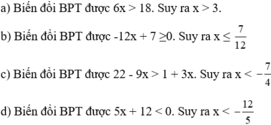
Hãy nhập câu hỏi của bạn vào đây, nếu là tài khoản VIP, bạn sẽ được ưu tiên trả lời.


1) \(|3-5x|>=4\)
\(< =>\orbr{\begin{cases}3-5x>=4\\3-5x>=-4\end{cases}}\)
\(< =>\orbr{\begin{cases}-5x=1\\-5x=-7\end{cases}}\)
\(< =>\orbr{\begin{cases}x=\frac{-1}{5}\\x=\frac{7}{5}\end{cases}}\)
\(vay:x_1=\frac{-1}{5};x_2=\frac{7}{5}\)
CÂU 2 , 3 ,4 THÌ TƯƠNG TỰ ( CHIA THÀNH HAI TRƯỜNG HỢP RỒI GIẢI)

1
a (9+x)=2 ta có (9+x)= 9+x khi 9+x >_0 hoặc >_ -9
(9+x)= -9-x khi 9+x <0 hoặc x <-9
1)pt 9+x=2 với x >_ -9
<=> x = 2-9
<=> x=-7 thỏa mãn điều kiện (TMDK)
2) pt -9-x=2 với x<-9
<=> -x=2+9
<=> -x=11
x= -11 TMDK
vậy pt có tập nghiệm S={-7;-9}
các cau con lai tu lam riêng nhung cau nhan với số âm thi phan điều kiện đổi chiều nha vd
nhu cau o trên mk lam 9+x>_0 hoặc x>_0
với số âm thi -2x>_0 hoặc x <_ 0 nha

\(a,\dfrac{x-3}{x}=\dfrac{x-3}{x+3}\)\(\left(đk:x\ne0,-3\right)\)
\(\Leftrightarrow\dfrac{x-3}{x}-\dfrac{x-3}{x+3}=0\)
\(\Leftrightarrow\dfrac{\left(x-3\right)\left(x+3\right)-x\left(x-3\right)}{x\left(x+3\right)}=0\)
\(\Leftrightarrow x^2-9-x^2+3x=0\)
\(\Leftrightarrow3x-9=0\)
\(\Leftrightarrow3x=9\)
\(\Leftrightarrow x=3\left(n\right)\)
Vậy \(S=\left\{3\right\}\)
\(b,\dfrac{4x-3}{4}>\dfrac{3x-5}{3}-\dfrac{2x-7}{12}\)
\(\Leftrightarrow\dfrac{4x-3}{4}-\dfrac{3x-5}{3}+\dfrac{2x-7}{12}>0\)
\(\Leftrightarrow\dfrac{3\left(4x-3\right)-4\left(3x-5\right)+2x-7}{12}>0\)
\(\Leftrightarrow12x-9-12x+20+2x-7>0\)
\(\Leftrightarrow2x+4>0\)
\(\Leftrightarrow2x>-4\)
\(\Leftrightarrow x>-2\)

Bài 1:
a) Ta có: \(2\left(3-4x\right)=10-\left(2x-5\right)\)
\(\Leftrightarrow6-8x-10+2x-5=0\)
\(\Leftrightarrow-6x+11=0\)
\(\Leftrightarrow-6x=-11\)
hay \(x=\dfrac{11}{6}\)
b) Ta có: \(3\left(2-4x\right)=11-\left(3x-1\right)\)
\(\Leftrightarrow6-12x-11+3x-1=0\)
\(\Leftrightarrow-9x-6=0\)
\(\Leftrightarrow-9x=6\)
hay \(x=-\dfrac{2}{3}\)

\(4x^2-4x-5\left|2x-1\right|-5=0\)
\(\Leftrightarrow-5\left|2x-1\right|=5-4x^2+4x\)
\(\Leftrightarrow\left|2x-1\right|=\frac{-4x^2+4x+5}{-5}\)
\(\Leftrightarrow\left|2x-1\right|=\frac{4x\left(x-1\right)}{5}-1\)
TH1 : \(2x-1=\frac{4x\left(x-1\right)}{5}-1\Leftrightarrow2x=\frac{4x\left(x-1\right)}{5}\)
\(\Leftrightarrow10x=4x^2-4x\Leftrightarrow14x-4x^2=0\)
\(\Leftrightarrow-2x\left(2x-7\right)=0\Leftrightarrow x=0;x=\frac{7}{2}\)
TH2 : \(2x-1=-\left(\frac{4x\left(x-1\right)}{5}-1\right)\Leftrightarrow2x-1=-\frac{4x\left(x-2\right)}{5}+1\)
\(\Leftrightarrow2x-2=-\frac{4x\left(x-2\right)}{5}\Leftrightarrow10x-10=-4x^2+8x\)
\(\Leftrightarrow2x-10+4x^2=0\Leftrightarrow2\left(2x^2+x-5\ne0\right)=0\)tự chứng minh
Vậy tập nghiệm của phương trình là S = { 0 ; 7/2 }

\(3x-1\le23\)
\(\Leftrightarrow3x-1+1\le23+1\)
\(\Leftrightarrow3x\le24\)
\(\Leftrightarrow x\le8\)
a,<=>3x<=24
<=>x<=8
Vậy ....
b, <=>4x-8>=9x-3-2x-1
<=>4x-9x+2x>=8-3-1
<=>-3x>=4
<=>x>=-4/3 Vậy ....

\(\Leftrightarrow3x^3-3x+x-1\ge0\\ \Leftrightarrow3x\left(x-1\right)\left(x+1\right)+\left(x-1\right)\ge0\\ \Leftrightarrow\left(x-1\right)\left(3x^2+3x+1\right)\ge0\\ \Leftrightarrow x-1\ge0\left(3x^2+3x+1=3\left(x+\dfrac{1}{2}\right)^2+\dfrac{1}{4}>0\right)\\ \Leftrightarrow x\ge1\)
ủa -4x sao lại thành-3x+x vậy bạn:((